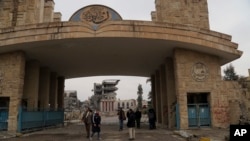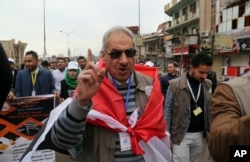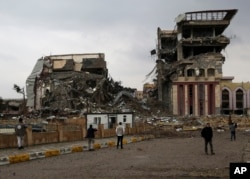Professors were among the workers who turned up on Monday to clear away rubble and prepare for a resumption of classes at the renowned University of Mosul, wrecked by the militants of Islamic State.
The Sunni Islamists looted the university after seizing Iraq's second largest city in 2014. They set faculties and a treasured library on fire during days of fighting with government forces who pushed them out of the campus in January.
The sprawling campus has been mostly deserted since then as soldiers painstakingly removed booby traps planted by the group.
But on Monday professors, administrative staff and cleaners joined hands to sweep away debris and assess the damage.
“We want to resume teaching soon. We want to do what is possible after all this destruction and war,” said Atta Allah Fahad Mikhlef, a biology professor.
He was collecting glass flasks which had survived a fire set by the militants in a laboratory, and loading them into boxes to take to classrooms.
Waiting on electricity
Officials have not given a date for the resumption of studies and there is still no power. But the scene is one of the signs of normality returning to eastern Mosul as displaced people return home and shops reopen.
That contrasts with life in western Mosul, 700 meters from the university on the other bank of the Tigris. Artillery fire could be heard on Monday from the Old City, where Islamic State fighters are still holed up.
“Laboratory equipment has been destroyed and will be difficult to replace inside Iraq. Priceless books have been destroyed,” Mikhlef said. “But we have some materials left.”
Forbidden ideas
The militants set the ground floor of his faculty on fire.
In one room, they had poured tar over three chairs but appear to have perhaps been in too much of a hurry to torch them before leaving.
Algebraic formulas written years ago, during one of the last teaching sessions, remained on a white board.
Another room was full of biology books, still in their plastic wrappers, which had luckily survived the destruction despite containing such forbidden ideas as evolution.
With the library gone another professor, Abdelaziz Safhan, had brought in a few books and materials downloaded from the internet.
“If we get electricity we can resume work,” he said, standing in front of his empty old classroom. “The chemistry ovens work fine.”
In an administrative building, cleaners threw charred furniture out of a first-floor window.
Not all buildings safe
Some buildings remain off limits as the army has yet to clear all booby traps. Others were destroyed in an air strike in 2016 against a suspected Islamic State chemical weapons laboratory.
During the Islamic State occupation, Baghdad stopped money transfers to Mosul to prevent the group from seizing the funds.
“The government seems to have forgotten us. We haven't been paid for three years,” Mikhlef said. “But we want to work. The university is my home.”







